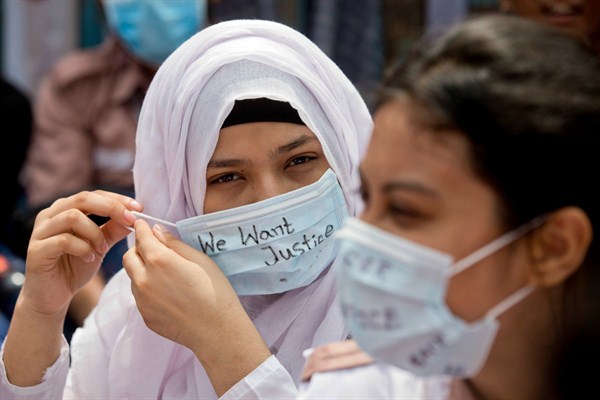Bangladesh’s prime minister, Sheikh Hasina Wajed, doesn’t seem to be taking any chances before national elections in December, in which she hopes her Awami League will win an unprecedented third consecutive term in office. While she seeks the domestic and international legitimacy that was missing in her 2014 election victory, after arguably the most bloody and controversial polls in the country’s history, she also can’t afford to lose a zero-sum contest with the opposition Bangladesh Nationalist Party, or BNP, which her government has made more toxic with a series of increasingly coercive measures against it. The second objective has overshadowed the first. But while the Awami League has spent much of this and its previous term in power, from 2009 to 2014, focused on suppressing its political rivals in the BNP and allied Jamaat-i-Islami, it has expanded its targets since 2016 to include a liberal and secular civil society.
On Aug. 5, plainclothes police arrested well-known and highly respected photojournalist Shahidul Alam, dragging him from his home barefoot and blindfolded, after he condemned the government’s repression of large student protests in an Al Jazeera interview. Speaking to Reuters last week, Hasina called Alam a “mentally sick” instigator and justified the charges against him—for online speech that “hurts the image of the country”—under the highly flawed Information and Communication Technology Act. Given Alam’s reputation, his jailing has resonated with civil society at home and abroad. Whatever international goodwill the government won for its handling of the Rohingya refugee crisis is being squandered.
The students that Alam was allegedly instigating began their protests after the death of two teens in a car accident in the capital, Dhaka, in late July. The demonstrations soon expanded beyond calls for better road safety to broader issues of governance. The government responded with blunt force; police fired rubber bullets and tear gas into the crowds and Awami League youth groups attacked the protesters, some of whom were schoolchildren. It has been a fitting finale to a five-year governing term that has seen a party, whose founding leaders fought for independence from Pakistan on the basis of secularism and democracy, take Bangladesh to authoritarian extremes.

